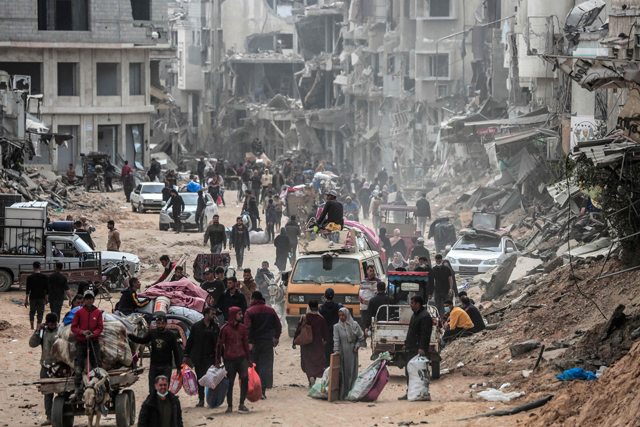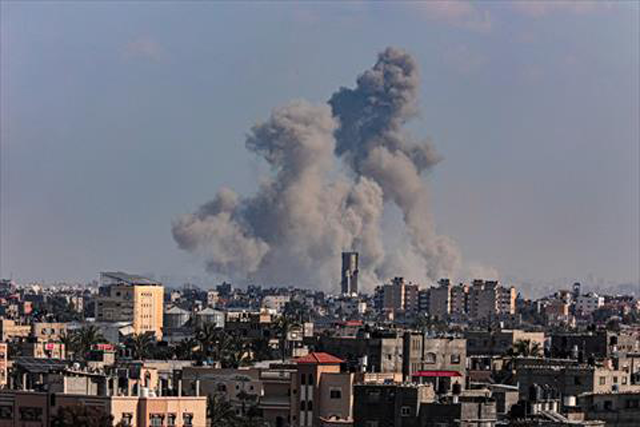You are here
Envoys push for Gaza truce before Ramadan starts next week
By AFP - Mar 06,2024 - Last updated at Mar 06,2024

Displaced Palestinians carry their belongings through a street in Khan Yunis in the southern Gaza Strip on Wednesday (AFP photo)
GAZA STRIP, Palestinian Territories — Envoys pushed on with efforts for a Gaza truce and hostage release deal in Cairo talks Wednesday, hoping to halt nearly five months of fighting before the start of Ramadan next week.
US President Joe Biden had urged Hamas to accept a ceasefire plan with Israel before the Muslim fasting month begins, which could be as early as Sunday, depending on the sighting of the crescent moon.
As negotiators in Egypt sought to overcome tough stumbling blocks, deadly fighting again rocked Gaza where the UN warns famine looms and desperate crowds have stopped and looted food aid trucks.
Dire shortages of food and water amid the devastating Gaza war sparked by Hamas's October 7 attack have killed at least 18 people, said medics in the Hamas-controlled Palestinian territory.
Biden on Tuesday called on the Palestinian resistance group to accept the truce plan brokered by US, Qatari and Egyptian mediators, saying “it’s in the hands of Hamas right now”.
The proposed deal would pause fighting for “at least six weeks”, according to a White House statement on talks between US National Security Adviser Jake Sullivan and the Qatari prime minister.
It would also see the “release of sick, wounded, elderly and women hostages” and allow for “a surge of humanitarian assistance”, they said in a Washington meeting on Tuesday.
One known sticking point centres on an Israeli demand for Hamas to hand it a list of the about 100 hostages believed to still be alive, a task Hamas says it can’t complete while bombing continues.
The group said in a statement that it had “shown the required flexibility with the aim of reaching an agreement requiring a comprehensive cessation of aggression against our people”.
Biden stressed that “there’s got to be a ceasefire because Ramadan, if we get into circumstances where this continues to Ramadan, Israel and Jerusalem could be very, very dangerous”.
In past years, violence has flared during Ramadan in annexed east Jerusalem’s Al Aqsa Mosque compound — Islam’s third-holiest site and Judaism’s most sacred, known to Jews as the Temple Mount.
Hamas has urged Muslims to flock there in great numbers, as they do every year, while some Israeli far-right politicians have argued they should be banned this year.
Israel’s government said on Tuesday that Muslim worshippers would initially be allowed to the site “in similar numbers” as in recent years, but that this would be followed by a weekly “situation assessment in terms of security and safety”.
Related Articles
GAZA STRIP, Palestinian Territories — Israel pressed on with its offensive against Gaza on Sunday with no truce in sight on the eve of the M
HAGERSTOWN, United States — US President Joe Biden warned Tuesday of a “very, very dangerous” situation if Israel and Hamas fail to reach a
GAZA STRIP, Palestinian Territories — Efforts to hammer out a temporary truce in Gaza intensified on Tuesday after months of war that have l

















